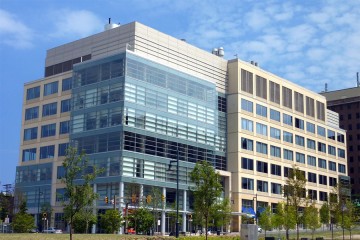Johns Hopkins University today unveiled specific steps it plans to take to cultivate and support a culture of innovation and entrepreneurship and respond to the strategic challenges detailed in last year's committee report on the topic.
The implementation plan, the release of which was announced today to the university community in a message from JHU President Ronald J. Daniels, addresses the 22 specific recommendations to bolster the university's innovation initiatives that were included in the May 2014 innovation report.
The plan details some efforts that are already under way—including the recent opening of an interim space for the FastForward East business accelerator in East Baltimore and the launch of a mentoring program for aspiring entrepreneurs—as well as new endeavors, including the creation of a pre-seed grant program to support inventions in the early stages and the establishment of a new, permanent home for FastForward East at 1812 Ashland St., within walking distance of the university's medical campus. That space is currently scheduled to open in late 2016.
All told, the plan represents $40 million in new university investment in innovation initiatives over five years.
"This is an exciting moment for innovation and entrepreneurship at research universities, especially Johns Hopkins," Daniels wrote. "Discovery and entrepreneurial endeavor are converging in unprecedented ways. Investigators are moving more easily along a spectrum between basic and applied research, and urban universities like ours are increasingly playing a role as igniters of economic growth in our communities."
In August 2013, Daniels and School of Medicine Dean Paul B. Rothman formed the faculty-led Committee on the Innovation Ecosystem to consider options for an innovation center to support the university's scholar-inventors. The committee consulted widely across the university community, considered a wide range of internal and external studies and information, visited innovation hubs around the nation, and solicited feedback from prominent venture capital firms and pharmaceutical and biotech companies. The committee's 22 recommendations were grouped into three categories:
Space: A physical space for innovation in East Baltimore that is integrated with other areas of such activity across the university
Funding: Seed funding and an investment fund to fuel the translation of discoveries into marketable inventions
Services: A more extensive and fluid set of commercialization services, educational opportunities, policies, and infrastructure to support the entrepreneurial aspirations of our community.
"The committee heard a resounding call from our faculty and students about the opportunities they see for us to do even more to help them bring their best ideas to people's lives," Daniels wrote today.
The implementation plan released today details how the university will meet each of those challenges. The initiatives described will be carried out by Johns Hopkins Technology Ventures, a new organizational entity that encompasses technology licensing, corporate and industry relations, and FastForward.
"From the nexus of life sciences discovery in East Baltimore, to the studios of the Peabody Institute, to the labs and classrooms of the Krieger, Whiting, and Carey Schools, Johns Hopkins is seizing new opportunities to amplify the humanity, curiosity, and creativity that are hallmarks of our enterprise," Daniels wrote. "As we do, we will continue to change the world for the better."
Posted in University News
Tagged entrepreneurship, technology ventures








